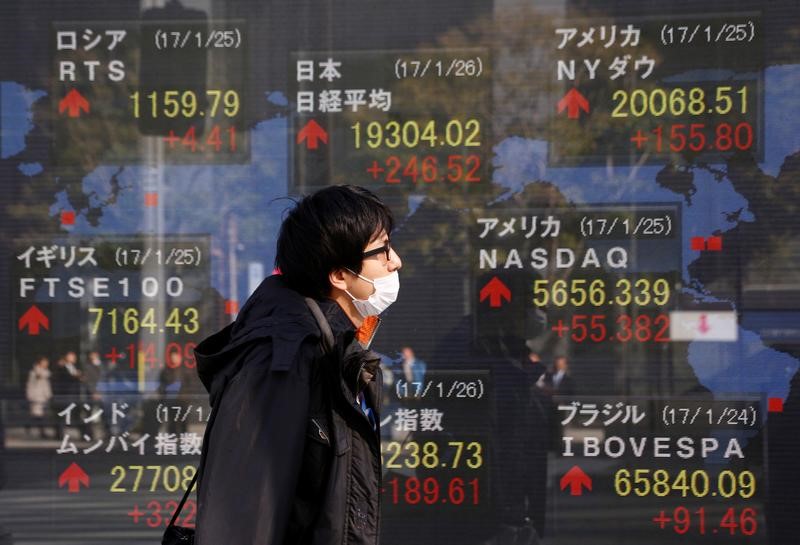By Shinichi Saoshiro
TOKYO (Reuters) - Asian stocks handed back earlier modest gains and drifted lower on Monday, running short of incentives to push past two-year highs with many key markets closed for holidays.
The pound, meanwhile, nursed losses after a poll showed a shrinking lead for Prime Minister Theresa May's party in Britain's upcoming elections. MSCI's broadest index of Asia-Pacific shares outside Japan (MIAPJ0000PUS) was down 0.2 percent. Taking cues after the S&P 500 (SPX) and Nasdaq (IXIC) scraped to record closing highs, it had earlier risen towards a two-year peak marked on Thursday.
Japan's Nikkei (N225) edged up 0.1 percent while weaker commodities pushed down Australian shares (AXJO) 0.5 percent. The closure of Chinese, British and U.S. markets on Monday deprived investors of potential catalysts and kept overall trading subdued.
Brushing aside a North Korean missile launch, South Korea's KOSPI (KS11) initially touched an intraday record high before pulling back 0.1 percent. It was on track to snap a six-day winning streak.
Pyongyang fired what appeared to be a short-range ballistic missile early on Monday.
The dollar index against a basket of major currencies was steady at 97.465 (DXY) after rising on Friday thanks to upbeat U.S. gross domestic product data.
The index fell to a 6-1/2-month low below 97.00 a week ago on U.S. political concerns centred on President Donald Trump, but have since crept back.
The dollar and U.S. stocks would face downward risks if trouble for the Trump administration becomes a long-term concern, said Masafumi Yamamoto, chief forex strategist at Mizuho Securities.
"That said, the possibility of the president actually being impeached remains very low, and any negative pressure on U.S. stocks has been limited so far."
The greenback was steady at 111.290 yen <JPY=>, with the safe-haven Japanese currency showing little reaction to North Korea's missile launch.
"While the North Korean situation remains tense, the market has gotten used to missile launches, with broader volatility also declining," said Shusuke Yamada, senior strategist at Bank of America (NYSE:BAC) Merrill Lynch in Tokyo.
"The U.S. markets will also be shut today, and that is curbing incentive and restricting overall movements as well."
The pound was a shade higher at $1.2828 <GBP=D4> after dropping more than 1 percent on Friday to as low as $1.2775.
Sterling suffered its steepest fall since January on Friday after an opinion poll showed the governing Conservatives' lead over the Labour opposition down to just 5 percentage points with less than two weeks before a general election.
The euro declined 0.1 percent to $1.1165 <EUR=>. The common currency had soared to a 6-1/2-month high of $1.1268 last week on factors including relief at the French presidential election outcome, but it has failed to make further headway.
South Africa's rand was turbulent after reports President Jacob Zuma defeated a no-confidence motion against him.
The rand went to a two-month high of 12.65 per dollar <ZAR=D3> before pulling back to 12.85.
Crude oil prices slipped, their modest recovery from disappointment over last week's OPEC meeting sputtering out on the back of a relentless rise in U.S. drilling. [O/R]
Oil suffered a big drop last week after an OPEC-led decision to extend production curbs did not go as far as many investors had hoped.
U.S. crude (CLc1) was down 0.2 percent at $49.63 a barrel, having slumped to as low as $48.18 on Friday. Brent fell 0.3 percent to $49.63 a barrel (LCOc1).

Spot gold <XAU=> hovered close to a near four-week high of $1,269.50 an ounce hit on Friday, led higher by investors who feared political risks.